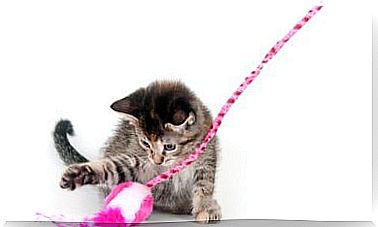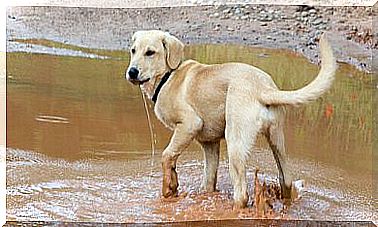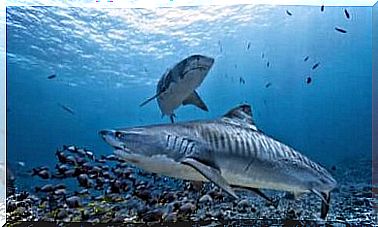The Effect Of Cold Water On Dogs: Is It Good Or Bad?
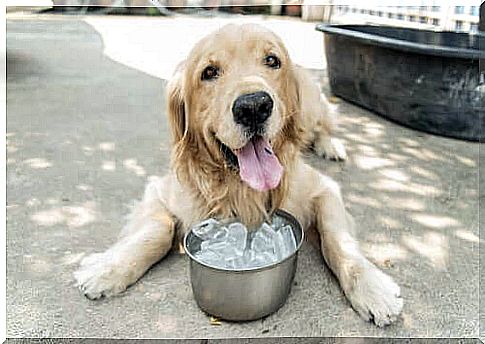
Year after year, given the progressive rise in temperatures, we find ourselves more and more often looking for ways to cool our dog, perhaps with frozen water or ice cubes. But are we sure they are effective and safe methods for the animal? Today we want to talk about the effect of cold water on dogs.
The myth about the deadly effect of cold water on dogs
There is a myth that it is dangerous for dogs to take ice or frozen water. According to this belief, the risk is that of intestinal swelling which can lead the animal to contract gastric dilatation-torsion syndrome. A syndrome that can cause death.
What is gastric dilatation-torsion syndrome?
Gastric dilatation-torsion syndrome (GDV) is a serious disease that includes a mortality rate ranging from 10 to 60%. This syndrome is the result of a buildup of gas, fluid, or a combination of both, in the stomach.
The stomach is hyper-distended by the liquid or gas, so much so as to make it necessary to rotate it around the axis of the esophagus and the cardia. Factors associated with the onset of this syndrome include aerophagia, the need for immediate delivery after a meal, and excess hunger.
When is this syndrome contracted?
Among the animals most easily affected by GDV are large or giant dogs with broad breasts. This category includes the Great Dane, the German Shepherd, the Poodle and all large mixed breed dogs.
Early diagnosis, proper care, surgery and post-operative follow-up are important factors in reducing the mortality rate.
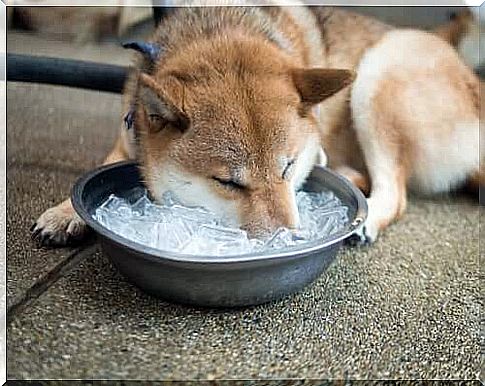
Can cold water cause this syndrome?
There is no evidence for a possible relationship between cold water and the contraction of this syndrome. The dangers of cold water on dogs seem more related to excessive consumption or too quickly.
Having therefore rejected the GDV hypothesis, veterinarians advise not to give too much cold water to a dog, especially after an intense play session. After all, just think about what happens to us if we sweat and drink a glass of ice water too quickly.
What is supposed to bring relief can lead to aches and pains. Perhaps the effect of cold water on dogs will not be harmful, but why take the risk?
When your four-legged friend is hot and thirsty, he will be led to drink water very quickly. Drinking too much and too fast is a very high risk factor for the contraction of intestinal bloating.
To avoid this, feed your dog often and in small portions in very hot weather. Also, don’t let him drink too much water all at once and wait at least an hour after a meal before giving him exercise.
What Are the Effects of Cold Water on Dog’s Teeth?
Ice cubes are a common cause of broken teeth in dogs. The thicker and harder the cube, the greater the chance that the tooth will break.
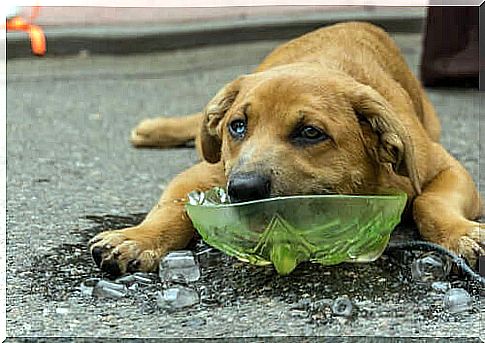
To tell you the truth, chewing any hard food too often can cause discomfort to your dog’s tooth enamel. If you really have to, give him a little ice cube.
Eating ice: are there any choking hazards?
Choking on a large ice cube can happen if your dog can’t chew it. Always make sure to give him small or already loose cubes to avoid taking the risk.
Animals that have already lost a few teeth or with advanced dental disease have more difficulty chewing and therefore run a greater risk of suffocation. Likewise, dogs with breathing difficulties or with some neurological alteration may be at greater risk in this regard.
In case of heatstroke: is it recommended to use ice?
In situations of excessive heat, experts advise against the use of ice. The indication in this case is to use cold water, but not ice-cold. The dog needs to cool down his throat to avoid constriction of the vessels.
During a heatstroke it is important to cool the dog without overdoing it. The advice is to wet it with water at room temperature, especially on the stomach and shoulders, with the exception of the head. Next, see a vet.
Even if you manage to contain heatstroke, the advice is to take it to a specialist anyway so as to be sure that the animal has not suffered internal damage. It is important to be able to recognize the signs of a heatstroke: redness of the gums, vomiting, gasping, staggering, confusion, difficulty breathing, hot body and excess saliva.


